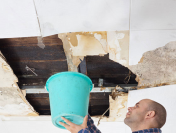How much do you know about smoke detectors and smoke detector usage? On Sunday, March 10, 2019, Daylight Saving Time begins in most of the United States, Canada and Mexico and we are reminded to change the batteries in our smoke detectors when we change the time on our clocks. Being smarter about fire safety can save the lives of family members and pets and protect your home in the unfortunate event of an accidental fire. Test your smoke detector and fire safety IQ by taking this quiz and learn why it’s so important to make sure the smoke detectors in your house are working properly.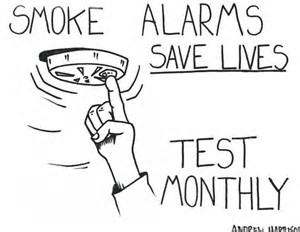
1. How many types of smoke detectors are there?
Although there are many different brands of smoke detectors, there are two basic types: ionization and photoelectric. Ionization smoke alarms are quicker to warn about flaming fires. Photoelectric alarms are quicker to warn about smoldering fires. It is best to use of both types of alarms in the home or a combination ionization-photoelectric alarms, also known as a “dual sensor” smoke detector. (Click here to read more about ionization vs. photoelectric smoke detectors.)
2. What time of day do most house fire deaths occur?
According the U.S. FEMA, half of all home fire deaths happen between 11:00 p.m. and 7:00 a.m. when people are asleep. Additionally, three out of five home fire deaths result from fires in properties without working smoke alarms and more than one-third (38 percent) of home fire deaths result from fires in which no smoke alarms are present. That’s why it’s so important to have working smoke detectors in your home.
3. How many smoke detectors does the average home need?
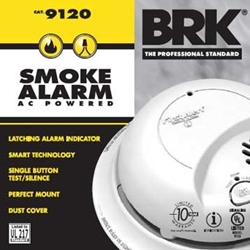 The average home needs smoke detectors on every level of the home, including the basement. Here’s where they should be installed:
The average home needs smoke detectors on every level of the home, including the basement. Here’s where they should be installed:
Bedrooms — Install smoke detectors inside each bedroom and outside every sleeping area.
Living and Family Rooms — On levels without bedrooms, install alarms in the living room, den or family room, or near the stairway to the upper level, or in both locations.
Kitchens — To prevent nuisance alarms in the kitchen, smoke detectors should be located at least 10 feet (3 meters) from cooking appliances.
Basements — Basement smoke alarms should be installed on the ceiling at the bottom of the stairs leading to the next level.
*Consider getting combo smoke/carbon monoxide detectors for kitchens, basements and living rooms where there are fuel-burning appliances.
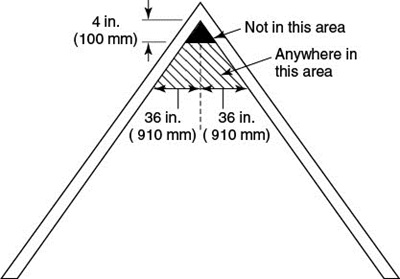 4. Where should a smoke detector be hung?
4. Where should a smoke detector be hung?
Since smoke rises, a smoke detector should be mounted on the ceiling or high on a wall. Ceiling mounted alarms should be installed at least four inches away from the nearest wall. Wall-mounted alarms should be installed 4 to 12 inches away from the ceiling. If you have ceilings that are pitched, install the alarm within 3 feet of the peak but not within the apex of the peak (or 4 inches down from the peak, per this diagram supplied by the NFPA).
Don’t install smoke detectors near windows, doors, or ducts where drafts might interfere with their operation.
5. How often should you test the batteries in your smoke detectors?
The National Fire Protection Association (NFPA) recommends testing smoke alarms at least once a month using the test button.
6. How often should you change smoke detector batteries?
Smoke alarms with non-removable 10-year batteries are designed to remain effective for up to 10 years. If the alarm chirps to warn that the battery is low, replace the entire smoke alarm right away.
Smoke alarms with any other type of battery (including backup batteries) need a new battery at least once a year. Estimated battery life in a smoke alarm can vary greatly based on battery type and brand, the environment where the alarm is installed, and how many times the alarm was activated. The Change Your Clock, Change Your Battery program reminds us to change our smoke detector batteries twice a year when Daylight Saving Time starts in mid-March and again in early November when we return to Standard Time.
*Important Reminder: If your smoke detector alarm chirps at any time to warn that the battery is low, replace the battery right away.
7. What is a “hard-wired” smoke detector?
Hard-wired smoke detectors are powered by A/C current and have a disposable backup battery in case of power outages. Hard-wired smoke detectors are considered safer because they will continue to operate on A/C power, even if the backup battery is dead.
8. What is an “interconnected” smoke detector?
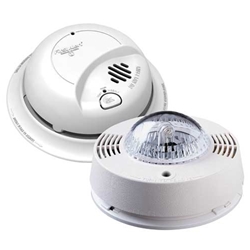 Interconnected smoke detectors communicate with the other smoke alarms in the house (either through a hard-wired connection or wireless RF radio signal) so they all the alarms go off at the same time, regardless of the location of the fire. Having an interconnected smoke detector system increases the chances that family members in unaffected areas of the house will hear the sound of an activated alarm and be able to get out of the house safely before it’s too late. Wireless interconnected smoke detectors are battery-powered, making them easy install without complicated wiring, especially in older homes.
Interconnected smoke detectors communicate with the other smoke alarms in the house (either through a hard-wired connection or wireless RF radio signal) so they all the alarms go off at the same time, regardless of the location of the fire. Having an interconnected smoke detector system increases the chances that family members in unaffected areas of the house will hear the sound of an activated alarm and be able to get out of the house safely before it’s too late. Wireless interconnected smoke detectors are battery-powered, making them easy install without complicated wiring, especially in older homes.
*Shopping Tip: When shopping for interconnected smoke detectors, look for the “tandem connections” rating which tells you how many units can be combined. It is also important that all of the alarms are from the same manufacturer. If the alarms are not compatible, they may not sound.
9. Bonus Question
So how did you do on our Smoke Detector Quiz? If you received a perfect score, good for you! It means you know how important it is for your home to be adequately equipped with working smoke detectors. If you didn’t get 100%, you now know how to use smoke detectors to protect your family and home from a catastrophic fire. And just for fun, here’s our Bonus Question that has a surprising answer: Who first invented Daylight Saving Time and why? Stumped? Â Click here for the answer.



